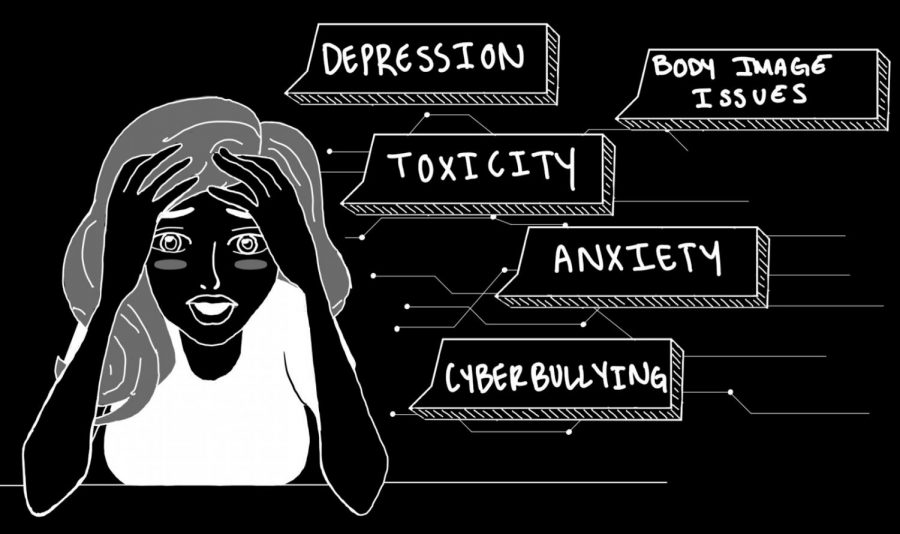Rise of an intangible poison
Unwholesome atmosphere resulting from social media polluting teenagers’ minds
As young people continue to become excessively active on the internet, the environment created has begun to take a harsh mental toll on teenagers. The Sidekick staff writer Varshitha Korrapolu discusses the perilous effects of social media and the internet.
February 1, 2021
Constantly scrolling through your feed. Comparing yourself to subjectively beautiful, flawless people who have spent countless hours editing their photos. Congestion forming in your chest as feelings of anxiety and negativity rush through your body.
A new, revolutionized poison has entered our lives, but not in the form of a substance. Internet culture manipulates teenage minds, accompanying the chaos and confusion during the difficult years of growing up.
Although the arrival of social media occurred about two decades ago, it is omnipresent in the current lifestyles of adolescents and taking advantage of them. An urge to fit in with the people around them inspired the use of social media as a tool to do just that.
“Because everything is online, everything can be misconstrued,” Coppell High School junior Arpita Rana said. “It’s good to spread awareness, but I feel like that same platform can turn against you. Because it can turn against you, people can become a little obsessed with what other people have to say about them. They will start taking notice of their flaws more than their [good] qualities.”
This constant battle of comparison and questioning whether someone is good enough has led to an increasing amount of youth experiencing mental illnesses, such as anxiety.
With peer pressure to become active on the internet, post pictures that scream perfection and find happiness in likes and comments, teenagers have developed an uncontrollable desire for a sense of acceptance in the eyes of people they do not even know.
Teenagers’ prefrontal cortex, the part of the brain associated with thinking and planning, lags in development compared to the limbic system, the part of the brain associated with emotions. Youths do not consider the long term consequences of engaging with the internet and a sense of competitiveness among peers arises.
The ability to be anonymous on social media has become an advantage for those that spread hate on the internet. Since saying harmful things has virtually no consequence, hate culture runs rampant. Those that have basic decency are victimized by this hate culture and can become vulnerable to insecurities or anxiety from having any internet presence at all. They enter the dark and tragic world of depression or antisocial disorder among others.
“It’s so easy to stay seated in your spot and type away instead of looking at someone’s face and say how you feel to their face,” CHS senior Mia Sims said. “[Social media and the internet] open up that easy line of communication, that easy access to harshness and critique.”
A vital reason why the environment on the internet has evolved to its current state is the lack of filtering of content exposed to teenagers. Youths constantly see demeaning comments and people looking their best when they do not know how those people really feel inside.
An increased amount of time spent on the internet and social media translates into a decreased amount of time spent with loved ones around you. In person, human-to-human interaction is irreplaceable; the memories fostered and the bonds created cannot be replicated by relationships made through online platforms. Would you want to bond with “friends” you have never actually met and have no idea what they look like or would you want to see the expressions on your friends’ faces while you are making memories that you will cherish forever?
As we move forward into life with technology and digital media, teenagers, parents and others are becoming apprehensive about what the future can hold regarding the environment created on the internet. Parents, such as CHS health science teacher Martha Eitelman, are worried about their teenagers growing up in the digital age and have started to monitor their children’s social media accounts to ensure the safety of their children.
“Technology isn’t going anywhere,” Eitelman said. “Social media isn’t going anywhere. How do we make it safe? What is always meant for good can always be used in a bad way as well. I don’t have an answer for how to do it, but I wish it could be done. I am scared to death to let my 12-year-old on social media.”
If people develop a sense of self-awareness and set limits for themselves by not using social media to document their lives every minute, every second of the day and not succumb to the digital monstrosity humans created, the toxicity of internet culture may start to diminish.
Not all poisons may be physical substances that people can stay away from. Some poisons penetrate into the mind through the environment you surround yourself with. As years pass by, the atmosphere internet culture created is becoming more toxic than ever and has led to people taking their own lives. Please do not try to fit in to the manipulative, lethal culture social media and the internet have created. Restrain yourself and continue to appreciate the beautiful things in your own life.
Follow Varshitha (@varshitha1128) and @CHSCampusNews on Twitter.











